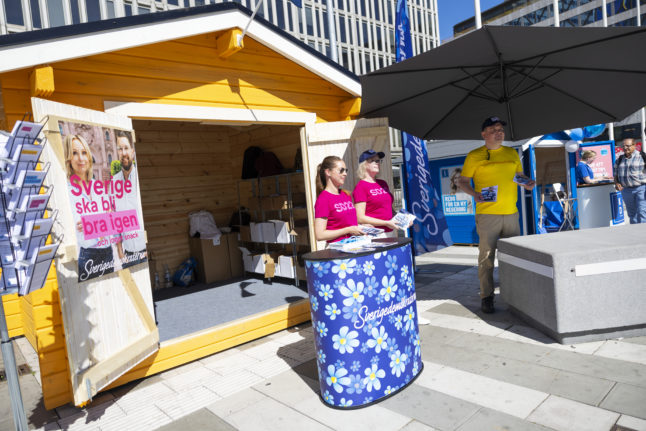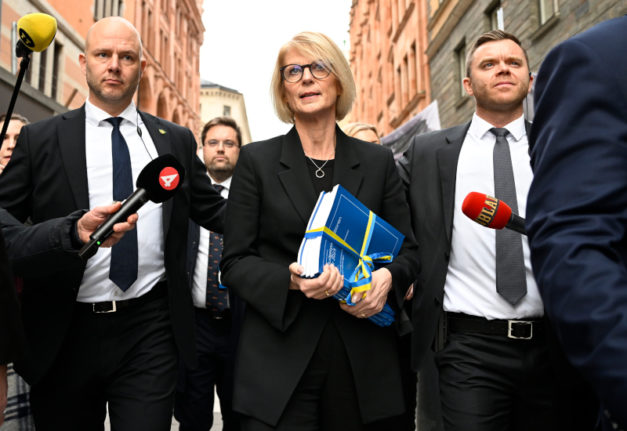Of the 20 responses we have received so far, almost all expressed disquiet at the rhetoric on immigration and integration in the election, which they perceived as coming from both the ruling Social Democrats and from the four rightwing parties trying to unseat them.
“I’ve found the focus on foreigners very confronting. Foreigners seem to be presented as the source of all Sweden’s problems. I worry this is a message that will impact my children,” wrote Kaia, 42, an Australian living outside Stockholm.
“The degree of xenophobic rhetoric by the major parties is shocking, and saddening,” agreed one US citizen, based outside Gothenburg. “I feel deeply unwelcome when I see that parties representing four-fifths of the electorate are proudly repeating anti-immigrant rhetoric, and then go on to hear the same from many Swedish colleagues.”
Yénika Castillo Muñoz said he had found the discourse in the election “quite aggressive”.
“From using fear to pointing directly at the migrant population as the causes of social issues – unemployment, insecurity, inequity – it’s almost like the parties are taking the opportunity to talk aggressive trash that looks like campaign promises but might not even be possible in practice,” she argued.
READ ALSO: How have you been finding Sweden’s election so far?
A British resident based in Skåne had similar concerns.
“The rhetoric being espoused, that [suggests] the solution to integration starts and ends with the behaviour of immigrants is frankly outdated and shows a general lurch towards right wing politics,” she complained. “No one is suggesting that Swedes bear any responsibility towards integration. If they really cared about integration they would strengthen access to and quality of SFI, as well as promote for Swedish nationals to take the time and effort to become friends with their non Swedish neighbours.”
“Immigration discourse is being led by the far right which seems to blame immigration for all problems,” said another Australian, also based in Stockholm.”Alternativ för Sverige make me feel unwelcome and unwanted. The Sweden Democrats blame foreigners for healthcare queues. The number of people who support these viewpoints is troubling.”
It wasn’t simply the strong negative rhetoric on immigration, integration and crime that concerned readers, but the way the issue was eclipsing other issues, such as improving the quality of healthcare and education in Sweden, and the climate crisis.
“Real problems like inflation, rents, [and the] climate crisis, are not really being tackled by the major parties,” Muñoz said. “Many in my network are wondering who the hell are we going to vote for – even people that were quite sure in their votes [in the last] elections.”
“Its disappointing and vague. I think the country needs to massively invest in primary healthcare or support a more functional private primary healthcare option,” said the second Australian. “No one seems to say anything other than vague platitudes like ‘shorten the queue’ or ‘regardless of wallet’, when what is needed is simply about three times the current number of staff. There has also been too much focus on crime, which is really a non-issue compared to health and education.”
“After the record heatwaves, forest fires and droughts through Europe this summer, why is the focus on immigration and not the environment?” asked the Brit in Skåne.
Some foreigners said they missed a sensible, technocratic alternative in the election.
“It feels like the solutions are too extreme: either ban everything without a clear plan and risk destabilising the economy, or do nothing to speed up decreasing fossil fuel dependency,” said Ovidiu, from Romania. “Either give police too much power or none at all; Either stop funding school or do nothing to fix problems or the other way around, ‘throw money at the problem’. Since I arrived in Sweden I have been impressed about a lot of things and solutions this Scandinavian country has implemented throughout time, but now it feels like people are intentionally acting stupidly and disingenuously.”
Taken together, respondents said they found the quality of debate in the election poor, with the 24 respondents on average rating the debate at 4 out of 10, with 0 being extremely poor and 10 being extremely good.
They also reported finding the campaign as a whole anti-immigration, with the average respondent rating it 3.9 out of 10, with 0 extremely anti-immigration and 10 extremely pro immigration.



 Please whitelist us to continue reading.
Please whitelist us to continue reading.
SD is playing by trump’s book and it seems that they are getting what they want, to just blame and don’t offer any solution. Then others try to talk about the same issues as SD ao that they don’t loose the game. Not knowing the winner of this game is only SD and no one else!